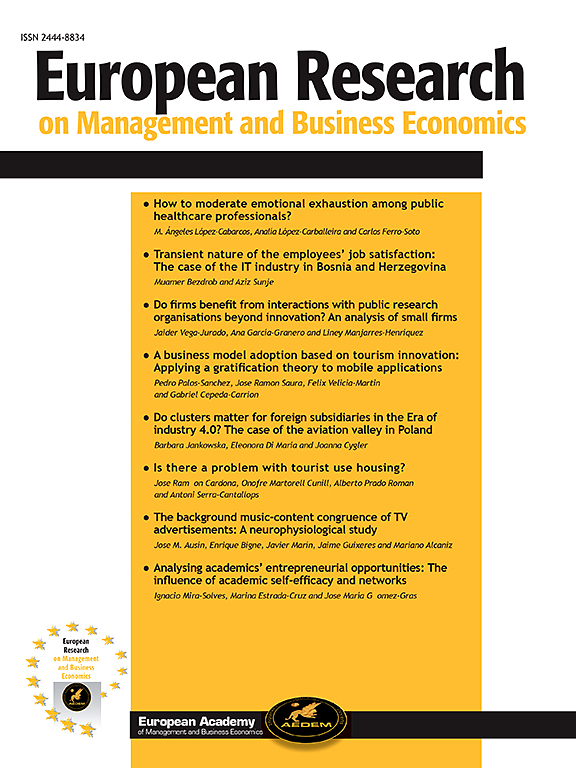The impact of capital structure on product responsibility and corporate reputation: Evidence from non-financial institutions listed on the London stock exchange
IF 6.4
3区 管理学
Q1 BUSINESS
European Research on Management and Business Economics
Pub Date : 2025-07-24
DOI:10.1016/j.iedeen.2025.100287
引用次数: 0
Abstract
Companies that prioritize product responsibility often develop stronger brand identities and foster greater consumer loyalty. However, these outcomes are influenced by the firm's capital structure. This study applies the trade-off theory to examine how capital structure affects product responsibility and corporate reputation. Using purposive sampling, the study analyzed 22 years of data (2002–2023) from 163 non-financial firms listed on the London Stock Exchange, sourced from Thomson Reuters Eikon DataStream. The analysis employed the Common Correlated Effects Mean Group (CCEMG) and two-step Generalized Method of Moments (GMM) estimation techniques. Findings reveal a significant negative relationship between the debt-to-equity ratio and both product responsibility and corporate reputation. Additionally, the interaction between governance and the debt-to-equity ratio negatively influences product responsibility but positively affects corporate reputation. To enhance product responsibility, companies should adopt sustainable practices, such as implementing environmentally friendly technologies and promoting supply chain transparency. Management may also consider increasing equity financing—through retained earnings or new share issuance—to improve financial stability and stakeholder confidence, thereby strengthening market perception and corporate reputation.
资本结构对产品责任和企业声誉的影响:来自伦敦证券交易所上市非金融机构的证据
优先考虑产品责任的公司通常会发展出更强的品牌形象,并培养出更高的消费者忠诚度。然而,这些结果受到公司资本结构的影响。本研究运用权衡理论检视资本结构如何影响产品责任与企业声誉。采用有目的的抽样,该研究分析了伦敦证券交易所上市的163家非金融公司22年(2002年至2023年)的数据,这些数据来自汤森路透Eikon DataStream。分析采用了共同相关效应均值组(CCEMG)和两步广义矩量法(GMM)估计技术。研究结果显示,负债权益比与产品责任和企业声誉之间存在显著的负相关关系。此外,治理与负债权益比的交互作用对产品责任产生负向影响,而对企业声誉产生正向影响。为了加强产品责任,公司应该采用可持续的做法,例如实施环境友好型技术和提高供应链透明度。管理层也可以考虑增加股权融资——通过留存收益或新股发行——以提高财务稳定性和利益相关者的信心,从而加强市场认知和公司声誉。
本文章由计算机程序翻译,如有差异,请以英文原文为准。
求助全文
约1分钟内获得全文
求助全文
来源期刊
CiteScore
11.70
自引率
3.40%
发文量
30
审稿时长
50 weeks
期刊介绍:
European Research on Management and Business Economics (ERMBE) was born in 1995 as Investigaciones Europeas de Dirección y Economía de la Empresa (IEDEE). The journal is published by the European Academy of Management and Business Economics (AEDEM) under this new title since 2016, it was indexed in SCOPUS in 2012 and in Thomson Reuters Emerging Sources Citation Index in 2015. From the beginning, the aim of the Journal is to foster academic research by publishing original research articles that meet the highest analytical standards, and provide new insights that contribute and spread the business management knowledge

 求助内容:
求助内容: 应助结果提醒方式:
应助结果提醒方式:


